Art as a bridge to unexplored faith conversations
Sculpturers, musicians, painters and others form a Christian network of artists in Europe. “God gives you both talent and responsibility”, they say.
WISLA (POLAND) · 15 JUNE 2022 · 12:08 CET
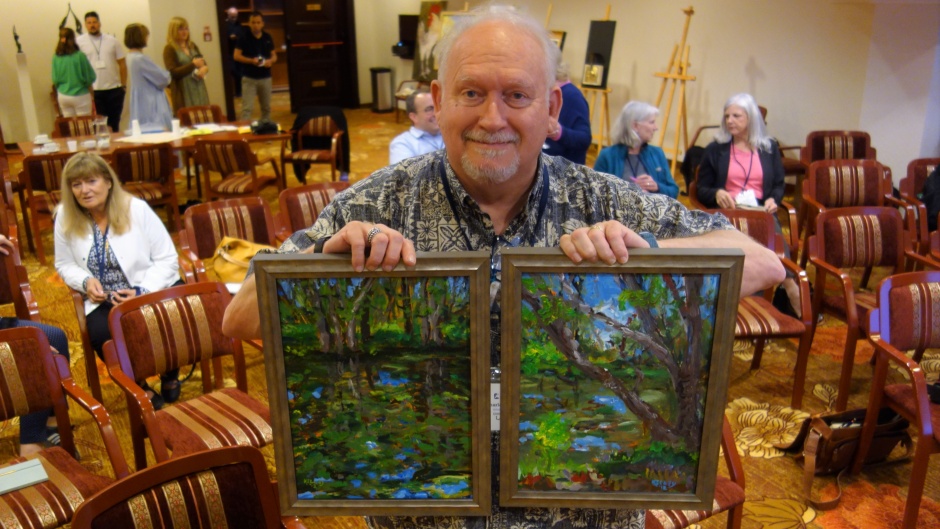
“Europeans love art - high art but also all sorts of other art: architecture, music, gardens, festivals”. The comments come from Charles Kelley, a Californian artist living in Latvia. In a large room filled with paintings and sculptures, he briefly responds to questions before the start of a new session.
Kelley is leading the artists network, a group of 25 people gathered in Wisla (Poland) as part of the larger programme of the European Leadership conference (ELF).
“Artists need encouragement, and this is my number one goal”, he continues, as the conversation around him starts to quiet down after the coffee break. “You need to recognise that your talent is from God, and God gives both talent and responsibility. We want people to get the opportunity to inspire each other and to ask the question: what can we do together that we cannot do alone”.
Another desire is to see conversations happen. “I’m very interested in bringing artists together, not only Christians, but non-Christians also. Because art is an amazing bridge in countless situations and categories”, Kelly says before he stands up to open a group discussion on the issue: ‘why creativity requires risk’.
Exploring eternity and bioethical questions through art
One of these artistic bridges should be built between theology and technology, thinks Eglé Tamulyté, better known for her artistic name, Aglaja Ray. Formed in the Vilnius Academy of Arts (Lithuania), she defines her work as interdisciplinary: “graphic art, performances, video art, painting on canvas…”
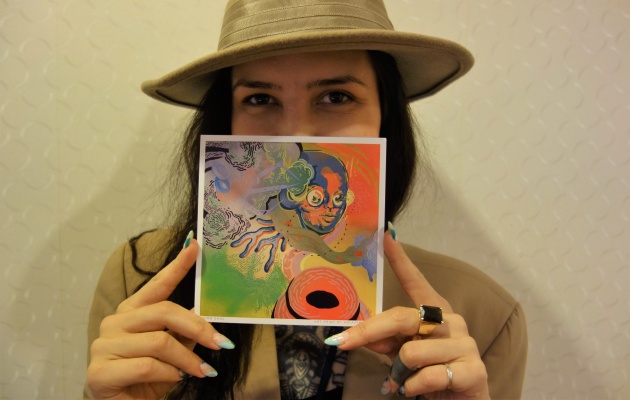
“We must understand the times we are living in”, she explains. “Technology is moving so fast, and movements such as transhumanism are strong. We need to raise bioethical questions because so many people are leaning on science for questions that matter, for instance, eternity”.
Recently, Aglaja has become more and more interested in research. “I explore the places where theology and technology intersect, my art describes these questions with visual storytelling”.
“I have this project in which I show the two ways that there are to access eternity: an artificial identity, through which some believe they can reach eternity with technologies like singularity. But there is also the Christian approach, that says you can reach eternity through Jesus Christ”.
Creative endeavours have “something metaphysical” in them, a sense of transcendence. “They bring us to something that is unseen but that does exist. This is why I believe we should have arts around us as a reminder of these unseen realities”.
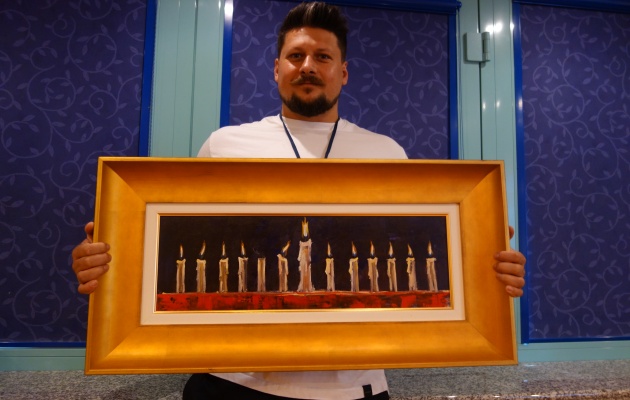
Understanding the gift from God
Adi Hunyadi is another participant of this year’s Arts Network of the ELF. He is half Hungarian and half Romanian. “I am a painter. Impressionist, conceptual, in a sense quite traditional. Oil on canva, oil on cardboard. But I want to go farther”.
He is on a journey. It took him some time to realise that “this gift is from God. Before, I was designer of interiors, I was in the same courtyard but in another room, so to say. I realised that painting is my thing, for my soul, and the way I can speak to the world about God”.
Also Elena Kaminsiené from Lithuania has been experiencing for years now, but in the field of poetry. She has now been able to publish Another Kind Of Love, a collection of poems from the last 20 years. “I consider them to be prayers to God. I try to express a cry to God that is in many other hearts as well”.
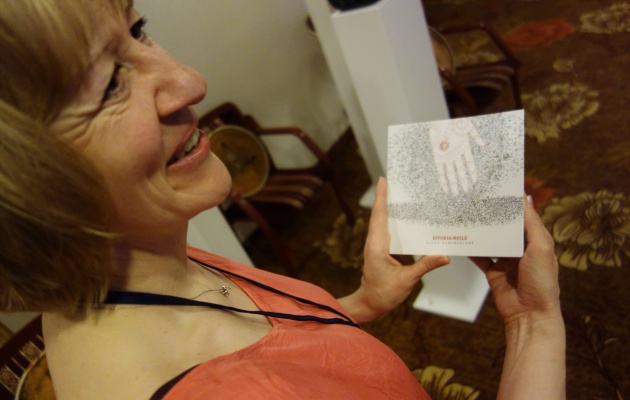
Pastors with an artistic calling
The group also includes church leaders. Among them is Luca Illiano, an Italian sculptor. “I work in a church planting project in the place I was born. I see lots of barriers, people who are sceptic and don’t want to have a chat about the gospel - but they are more open to art”.
Lately, Luca has been working on a series of clay sculptures called The Prophets. “The idea is to communicate to the viewers that God spoke and is still speaking. Each sculpture symbolises the main idea that God wanted to say through that specific prophet”.
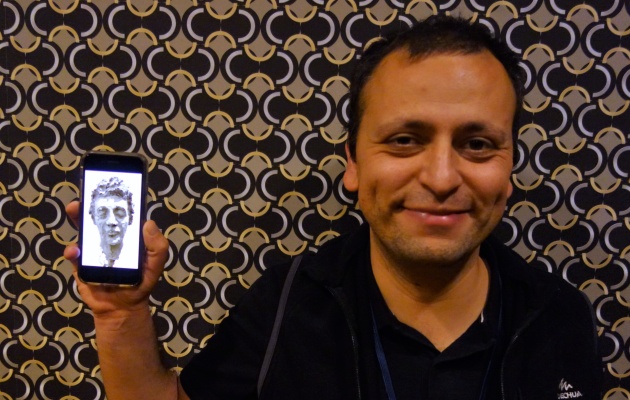
Are Italians still so much into art? “Yes, recent statistics showed that on a Sunday morning there a more people in museums and art galleries than in churches. As an artist, this makes me think I should do something to be involved where the people are”.
Also Sasa Nikolinovic leads a local church, in his case, in Bosnia Herzegovina. His aim is to raise awareness about the importance of arts for the spiritual life. He organises exhibitions in church contexts but also in larger public spheres. His diagnosis is that “in the evangelical world, many have a problematic relationship with art. With the Protestant Reformation, we threw the baby out with the dirty water, so in this generation we are trying to re-introduce art in our ways of living Christianity, both in our church communities and our individual spirituality”.
Art not propaganda
If Christians want to make a difference in a secularised Europe, “our art needs first to be very, very good”, concludes Charles Kelley.
He quotes a Swedish author: “If you understand art immediately, it is propaganda, if you have to think, it is art”. “So many Christians are influenced by their churches and subcultures to communicate propaganda”, he admits. The challenge is to encourage more and more artists to create beautiful bridges in a culture that often has lost its ability to connect with the deeper spiritual realities of life.
An unusual hymn
.jpg)
An interview with Cristian Cazacu, musician and director of Imago Dei Romania.
Question. How do you describe your own calling to arts?
Answer. My calling is something I can’t escape. Its accents may change overtime, and each season may come with different emphases (songwriter, performing artist, facilitator, teacher, mentor), but in essence I am drawn towards expressing myself through music, promoting other artists’ works, and teaching about the importance of arts in worship and Christian witness within the wider culture.
Q. In one of the plenary sessions of ELF 2022 you invited the crowd to sing a very special song. Tell us a bit about it.
A. The song “Un imn domnesc” (A Royal Hymn), was born in the most unusual way. Back in 2004 I worked for a week as an interpreter for a US missionary team at a local orphanage. The children there were all non-verbal, suffering from muscular dystrophia, making them incapable to speak or walk and move properly. So, there was not much to translate, except one older kid kept humming the same “tune.” I realised it was a tune only a few days later when I picked up my guitar and deciphered it.
It sounded quite melodious, and decided to finish it up for him and polish it. It had a medieval sound to it, 3/4 time signature, really beautiful.
Many years later, during my Masters degree at Fuller Theological Seminary in Pasadena (USA) when I studied Philippians 2:5-11, also known as “A Christ Hymn”, I decided to build the lyrics around the person and work of Christ (full lyric translation here).
Published in: Evangelical Focus - culture - Art as a bridge to unexplored faith conversations
Since you are here…
Evangelical Focus is a news and opinion platform that brings together Christians from across Europe and other parts of the world. We need the support of our readers to make this media project sustainable in the long term. You can support our work! Read about Evangelical Focus’s sustainability here.
Would you like to support the work of Evangelical Focus?
Use one of these methods. You can also transfer your donation to “Areópago Protestante / Evangelical Focus” IBAN: ES8521000853530200278394 (Swift / BIC: CAIXESBBXXX). Subject: “Donation Evangelical Focus”
